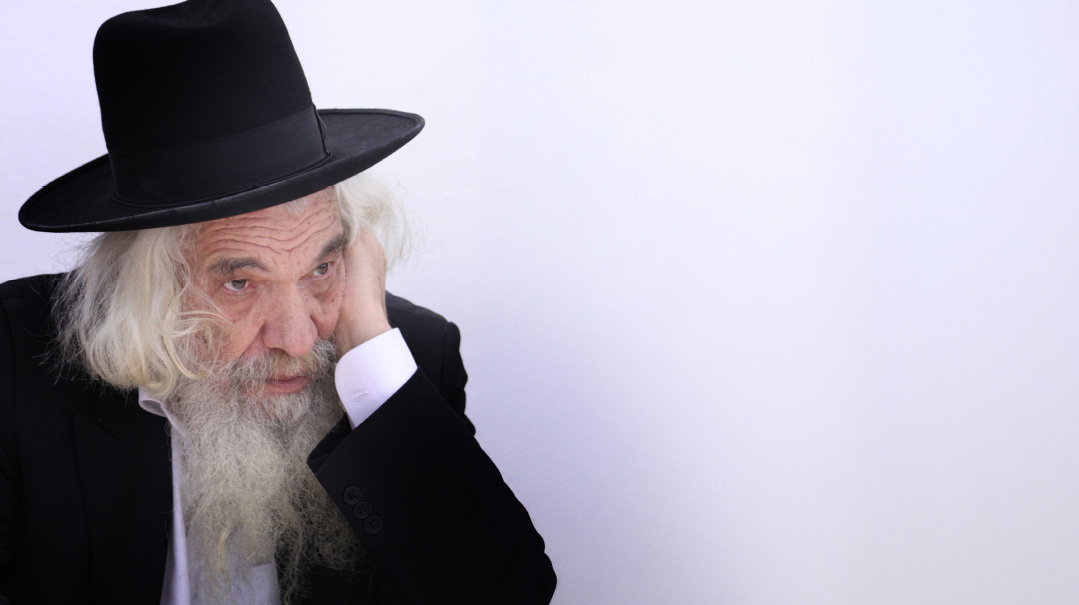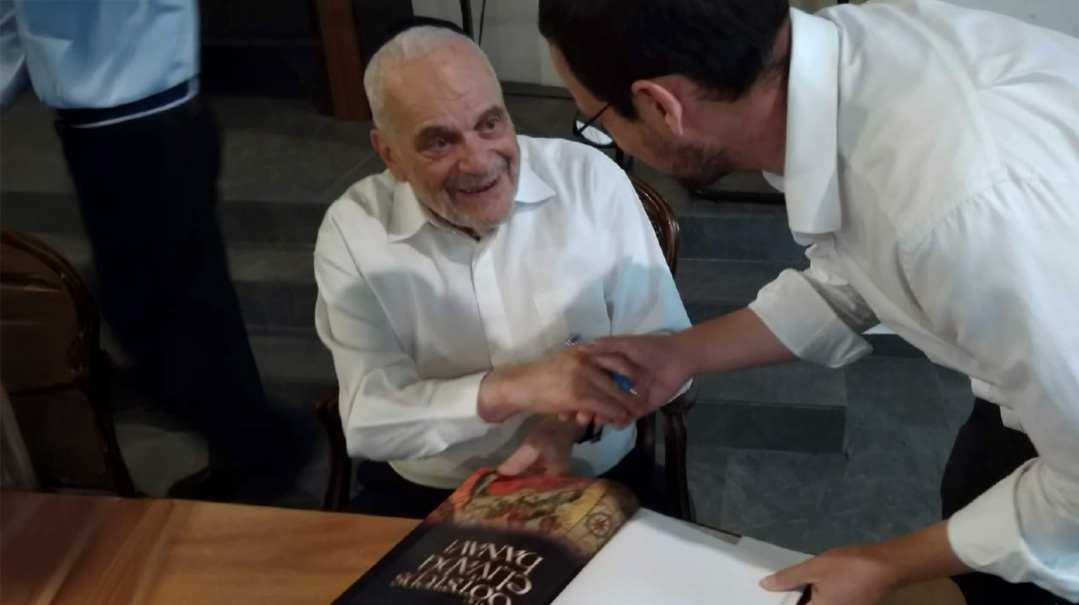Like a Burning Flame

In tribute to Rav Asher Deutsch ztz”l

Ponevezh Rosh Yeshivah Rav Asher Deutsch didn’t just believe that a yeshivah student or kollel avreich should be occupied with Torah throughout the day, not just during study hours. He actually lived it
W
hile many of the tens of thousands of mourners who accompanied Ponevezh Rosh Yeshivah Rav Asher Deutsch ztz”l to his final resting place last week had known him from his daily shiurim in the yeshivah’s beis medrash, perhaps only a fraction of them were able to truly grasp the depth of his teachings or appreciate the heights he’d achieved in Torah study during his lifetime.
“Rosh Yeshivah had tremendous talent, but he never made things easier for himself,” one talmid explained. “He fully utilized his sharp intellect and, combined with his renowned perseverance, achieved incredible heights in learning. His shiurim were so profound that students who hadn’t thoroughly prepared the sugya struggled to follow his reasoning.
“During his shiurim, he was like a burning flame,” the talmid continues. “He was completely absorbed in the sugya, oblivious to time. We once bought him a large wall clock and hung it in front of him to remind him when to conclude so that we could go and daven, but it didn’t help. We always had to remind him when it was time for the Minchah minyan.”
As part of his rare brilliance, Rav Deutsch was involved in writing and editing the lectures of Rav Shmuel Rozovsky, Ponevezh’s first rosh yeshivah, known for his extensive study of the commentaries and deep analytical approach. Other Torah luminaries, including current Slabodka Rosh Yeshivah Rav Dov Landau, entrusted their manuscripts to Rav Deutsch for his insights and annotations. After the passing of Rav Elazar Menachem Man Shach, Rav Deutsch was asked by Rav Shach’s son-in-law, Rav Meir Tzvi Bergman, to head the institute for the publishing of Rav Shach’s teachings.
R
av Asher HaKohein Deutsch’s light first shone on the first night of Chanukah, 5706 (1945). His father, Rav Binyamin Zev Deutsch, was a devoted confidant and right-hand man of the Ponevezher Rav, Rabbi Yosef Shlomo Kahaneman. Rav Binyamin Zev played a key role in establishing the yeshivah and managing its affiliated institutions, known as Batei Avot, and the Ponevezher Rav attended Asher Deutsch’s bar mitzvah seudah as a tribute to his father’s significant contributions.
Rav Deutsch acquired his early education at the Tashbar Talmud Torah, which at the time operated out of the home of the Chazon Ish. From there he moved on to Ponevezh’s yeshivah ketanah and then to the yeshivah gedolah, where he secured a distinguished place among the elite talmidim. Despite his young age compared to many of his peers, he earned a place of prominence among the yeshivah’s greatest talmidei chachamim. (It is told that after learning around the clock, he once fell into a sudden deep sleep in the middle of working through a sugya, and when his friends, noticing his unusual posture, awakened him, within seconds he resumed learning precisely from where he had left off.)
During these formative years, he developed a close relationship with the rosh yeshivah, Rav Shmuel Rozovsky, becoming one of the few students capable of fully grasping the depth of Rav Shmuel’s shiurim. After Rav Shmuel’s passing in 1979, leadership of the yeshivah passed to Rav Shach, and Rav Deutsch formed a deep and enduring connection with him.
“Rav Asher saw Rav Shach as his primary mentor,” says Rav Eliyahu Cohen, one of Rav Deutsch’s leading talmidim and longtime chavrusa. “He would consult him on every matter, whether personal or communal. He would often share with us stories of Rav Shach’s incredible diligence and the clear path he charted in his public battles, serving as a symbol and role model.”
Rav Asher married Rebbetzin Miriam, the daughter of Rav Raphael Eisenberg a”h. The Rebbetzin worked for many years as a midwife at the Mayanei Hayeshua Medical Center, and she also became a mentor for dozens of young people from dysfunctional or troubled families who made their way to the Deutsch home.
“The Rebbetzin and the Rosh Yeshivah were a team when it came to tzedakah and chesed,” says Rav Cohen. “Once, the Rosh Yeshivah heard about a Torah scholar in Bnei Brak who had broken his arm and was in severe pain. Without asking any questions, he and his wife took a comfortable armchair from their home and brought it right over to the home of this talmid chacham. Rav Asher explained to him that this chair had been particularly comfortable when he himself had been in a similar situation. He didn’t give a second thought to the idea that carrying a chair through the streets of Bnei Brak might seem unfitting for someone of his stature.”
Rav Deutsch’s talmidim relate how the Rosh Yeshivah would often engage in vigorous debates with the students, and the entire hall seemed ablaze with energy. While he would sometimes raise his voice and passionately debate those students whose arguments he found unconvincing, they knew never to take it personally. His fire was for extracting the truth of Torah, but even those talmidim on the receiving end of his arguments sensed his love for them.
“I remember how, after delivering such a shiur, the Rosh Yeshivah exited the beit medrash,” says a talmid. “Outside, it was pouring rain, and Rav Asher stood there without even an umbrella. He seemed to be looking for something. When he saw me, his eyes lit up. He asked me to call over another student — someone he had debated with during the shiur. Rav Asher sought his forgiveness, concerned that he may not have spoken to him with sufficient respect.”
S
hortly after his marriage, Rav Asher Deutsch moved to Jerusalem, where he served as a maggid shiur at Yeshivas Knesses Beis Aharon headed by Rav Ephraim Zureiven ztz”l. He also delivered chaburahs at the Mir, and later, he gave shiurim at Yeshivas Knesset Yitzchak in Hadera.
In late 1988, Rav Deutsch was asked by Rav Shach and by Ponevezh president Rav Avraham Kahaneman to become a maggid shiur in Ponevezh.
“Rav Asher began by giving shiur to first-year students,” recalls Rav Cohen. “In the following years, he delivered regular lectures to higher-level classes and eventually to the advanced kibbutz group. Until Elul, he continued to come to the yeshivah daily to deliver his shiurim.
“In addition to his regular shiur, which involved many hours of preparation,” Rav Cohen adds, “the Rosh Yeshivah had chavrusas practically around the clock. I was fortunate to learn together with him for many years, and I was in good company — one of his most well-known chavrusas was renowned Ezra Lemarpeh founder Rabbi Elimelech Firer.”
When Rav Cohen tries to think of a specific stringency or practice the Rosh Yeshivah was especially particular about, he mentions that, as scrupulous as he was in all mitzvos both bein adam l’chaveiro and bein adam laMakom, he was especially vigilant when it came to the possibility of transgressing any aspect of ribbis — he even wrote a sefer called Shaarei Ribbis.
“He was an expert in these in these matters, and many people sought his guidance regarding how to avoid actions that might be considered as taking interest from another person,” Rav Cohen says. “In addition, he was extremely meticulous regarding the mitzvah of arba minim, adhering to the Chazon Ish’s stringencies. Many students would come to his home before Succos to show him what they’d purchased or were considering buying. Sometimes the line wrapped around the block, but despite the pressure, he never turned anyone away.”
But the most important thing he emphasized, says Rav Cohen, is immersion in Torah. “He believed the mind must always be involved in Torah, and not just during set times for learning,” Rav Cohen relates. “A yeshivah student or kollel fellow, he taught, should be occupied with learning throughout the day. And he practiced what he preached. In his view, someone aspiring to spiritual greatness could not achieve it unless their mind was entirely absorbed in Torah during all their waking hours.”
A tense silence filled the room of the Rosh Yeshivah as family members gathered to bid farewell to their patriarch, whose passing was imminent.
“In the past year and a half, the Rosh Yeshivah battled a severe illness,” says Rav Cohen. “He underwent intense treatments, and somehow, he bounced back, with Hashem’s help. During that interim time, he maintained his schedule of shiurim without interruption, continuing to push himself. And he tried never to cancel his chavrusas – sometimes they’d join him at the hospital if he had the strength.”
About half a year ago, the illness resurfaced, and the Rosh Yeshivah began another series of treatments. Yet in the last two months, repeated hospitalizations due to infections and complications took their toll.
“His suffering was immense,” says Rav Cohen. “Once, one of his sons tried to remove a needle causing him discomfort, but the Rosh Yeshivah reprimanded him, saying it was forbidden for a son to perform such an act for his father. There were entire days when he couldn’t speak due to the pain and weakness. Still, when he returned home from the hospital, utterly exhausted, his first request was always for a sefer.”
And no matter how exhausted he was toward the end, he wouldn’t back out of his unwavering commitment to chinuch. “He’d just returned from a grueling treatment, when some family members of a boy enrolled in one of the institutions under his jurisdiction approached him,” Rav Cohen relates. “They told him that the administration had decided to expel the child due to behavioral issues. The Rosh Yeshivah, though frail and drained of energy, was quite upset. With superhuman strength, he exclaimed that no child should ever be removed from a yeshivah without a proper alternative, no matter the circumstances, contacted the people involved, and made sure the boy remained in the institution. That moment was a powerful message, timeless and universal.”
In his last month, the Rosh Yeshivah’s condition fluctuated, with periods of slight improvement followed by rapid decline. By Friday, 12 Kislev, his condition was deemed critical. His family came to bid him farewell. But then, suddenly, his vital signs stabilized and he awakened, interacting with his family. It seemed as if he’d rally after all.
“On Shabbat morning, he even requested a cup of wine for Kiddush,” Rav Cohen recalls. “He forced himself to drink, fulfilling the mitzvah of sanctifying the day. It was a true miracle — it was almost like techiyas hameisim, as though his soul clung to his body with superhuman tenacity. He used those moments of grace to perform another mitzvah.”
The hours that followed were fraught with tension. By Monday afternoon, 14 Kislev, his condition deteriorated rapidly, as family members and close disciples rushed to his bedside at Maayanei Hayeshua. This time, however, the malachim prevailed.
(Originally featured in Mishpacha, Issue 1042)
Oops! We could not locate your form.







